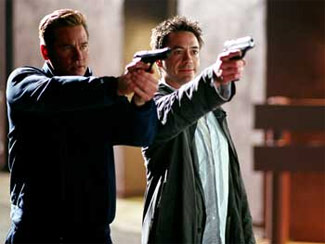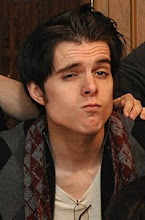Ok, so that's pretty high praise for a movie regardless of its pedigree. Let's start with the most basic element of any movie that can make or break it before any of the other elements can be taken into regard: the performances. Almost from the very first scene with all three principle actors together (after a fairly amusing and welcome cameo from Steve Zissou himself, Bill Murray), it's clear that the chemistry is natural and believable. Jack (Jason Schwartzman), Francis (Owen Wilson), and Peter (Adrian Brody) act as though they really have grown up together and carry all the social quirks, awkward interaction, and comfortable banter of real brothers. Whether this is a testament to the writing, script, or acting ability of the people involved is unknown, but as is usually the case with such a successfully executed film it is most likely a combination of all three factors. From a personal standpoint, my own close relationship with my younger brother greatly informed an added appreciation of the accuracy of the fraternal bonds on display here. I knew the movie was on the right track when Owen Wilson's character spoke this line to his brothers over a remotely uncomfortable dinner early in the film: " Did I raise us? Kind of?" While it may seem included for laughs or perhaps a slightly off-kilter informing of Francis' character, it spoke to a very peculiar portion of myself as an older brother. Of course to say such a thing is not only slightly arrogant, but mostly unfounded in general; I still found it resonant in the sense that I've had this thought at one time or another (perhaps to a lesser degree).
Each brother plays a different part in a dynamic which in real life plays very similar to the display shown here. Francis Whitman is the oldest brother and therefore takes on many of the leadership qualities (for better or worse) of his parents, most notably his mother. This plays with his brothers in interesting ways. Peter resents this attitude and vocally expresses his dislike of his older brother's domineering. This is emblematic of many middle children and, in my experience, of any younger sibling faced with the challenge of establishing their own identity. Jack takes the commands in a much more laid back fashion. It's clear he's young enough to heed his older brother as an authority figure, but also detached enough to not care if it inconveniences him. Individually, the brothers interact in very accurate and interesting ways too. Francis and Peter butt heads a lot in an effort to establish dominance: Francis because he feels it's his right as oldest and Peter in an effort to prove his worth in the middle. Meanwhile Peter and Jack get along much more amiably. To Peter, Jack is just his brother, feels no need to be his better, and can easily trust him almost to spite the smug Francis. Jack views both Peter and Francis as the same with very little variance. Francis and Jack share a similar relationship, the difference being that Francis regards his littlest brother as someone to be shepherded while not realizing Jack is unaffected either way.
So, why take up all this space to break down the relationship of the three brothers? Two reasons: Firstly to really define what I find is the core of the film and the fulcrum on which the rest of the movie clicks so well. Secondly to emphasize what I find to be the effectiveness and accuracy with which a sibling relationship is portrayed here, and why this makes the movie the best at having 'real' characters in an exaggerated world. Tie this all together with the fact that each brother is still reeling from the tragic death of their father a year earlier in their own unique way, and the rest of the movie can't help but benefit.
From here the fairly simple 'self discovery' plot is elevated to a much, much more meaningful level than it may have been had the core dynamics been as cliche as it certainly had the possibility of being. The three brothers, brought together by Francis after a near-death experience (highly suggested to be an almost suicidal event), set off on a train (the title-sharing Darjeeling Limited) across India on a journey of discovery, recovery, and (unbeknownst to Peter and Jack) a potentially chaotic reunion with their wayward and perhaps errant mother. It all plays with the trademark quirk and wit that's a staple of Wes Anderson movies. There are plenty of laugh out loud situations juxtaposed with fairly dramatic moments throughout. It becomes clear to the audience fairly early on that the brothers are using hefty emotional barriers as well as strong, illegal narcotics to numb themselves to the true issues at play. Before long the tensions become too hard to smile and ignore and, like any good healing process, the brothers tear into each other. It's fun to watch the brothers' infighting and how they are still uniquely close and brotherly through it all. So brotherly are they that they get themselves kicked off the train. Without their narcotics and only their sparkling personalities to comfort each other it isn't long before they each learn to overcome their differences and their hang-ups. Oh, and there's the amusing reunion with their mother (Anjelica Huston) who just so happens to be a nun.
The Darjeeling Limited is by far the best Wes Anderson film because it portrays an effective and relatable relationship, makes you want to go on an epic journey across India in search of self realization, and leaves you feeling like even though life may throw some rotten things at you that the answers are as close as you're willing to be to face them. Now if only we could somehow get a nice Criterion Collection release of this movie like all of the other Anderson films, we could all die happy.

Side Note: Coming Soon! Chapter by chapter book reviews... maybe?



